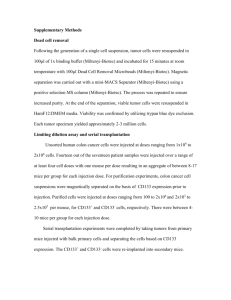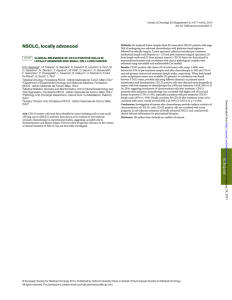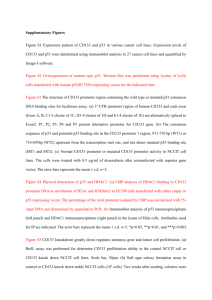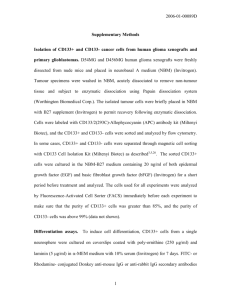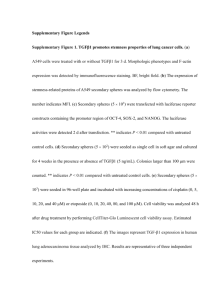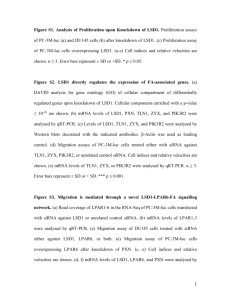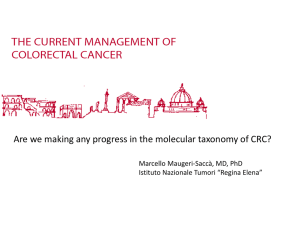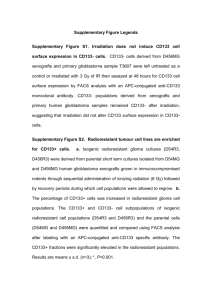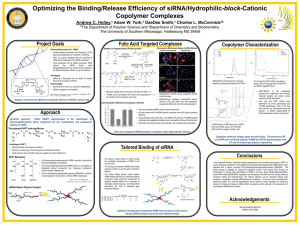Supplementary figure legends Figure S1: Positive and negative
advertisement
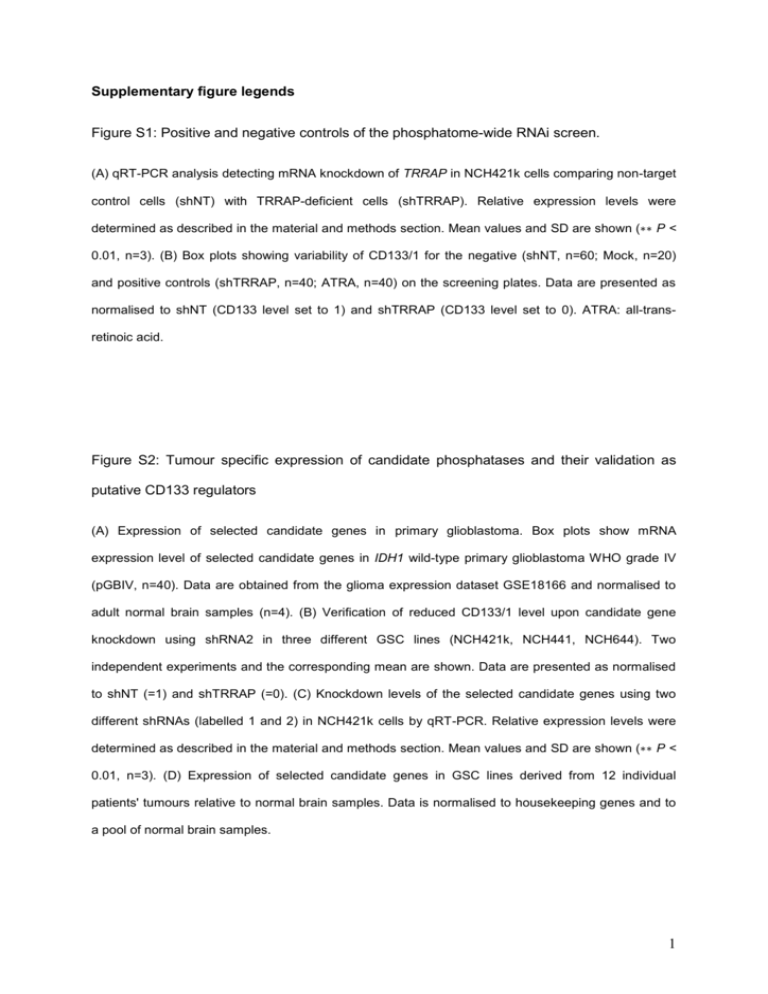
Supplementary figure legends Figure S1: Positive and negative controls of the phosphatome-wide RNAi screen. (A) qRT-PCR analysis detecting mRNA knockdown of TRRAP in NCH421k cells comparing non-target control cells (shNT) with TRRAP-deficient cells (shTRRAP). Relative expression levels were determined as described in the material and methods section. Mean values and SD are shown (∗∗ P < 0.01, n=3). (B) Box plots showing variability of CD133/1 for the negative (shNT, n=60; Mock, n=20) and positive controls (shTRRAP, n=40; ATRA, n=40) on the screening plates. Data are presented as normalised to shNT (CD133 level set to 1) and shTRRAP (CD133 level set to 0). ATRA: all-transretinoic acid. Figure S2: Tumour specific expression of candidate phosphatases and their validation as putative CD133 regulators (A) Expression of selected candidate genes in primary glioblastoma. Box plots show mRNA expression level of selected candidate genes in IDH1 wild-type primary glioblastoma WHO grade IV (pGBIV, n=40). Data are obtained from the glioma expression dataset GSE18166 and normalised to adult normal brain samples (n=4). (B) Verification of reduced CD133/1 level upon candidate gene knockdown using shRNA2 in three different GSC lines (NCH421k, NCH441, NCH644). Two independent experiments and the corresponding mean are shown. Data are presented as normalised to shNT (=1) and shTRRAP (=0). (C) Knockdown levels of the selected candidate genes using two different shRNAs (labelled 1 and 2) in NCH421k cells by qRT-PCR. Relative expression levels were determined as described in the material and methods section. Mean values and SD are shown (∗∗ P < 0.01, n=3). (D) Expression of selected candidate genes in GSC lines derived from 12 individual patients' tumours relative to normal brain samples. Data is normalised to housekeeping genes and to a pool of normal brain samples. 1 Figure S3: ENPP1 knockdown leads to increased GFAP expression and reduced levels of CD133 and LGR5 (A) Western blot analysis showing a marked E-NPP1 protein knockdown in NCH441 cells and a concomitant increase in GFAP expression. Protein levels were analysed 4 days after transduction with non-target shRNA (shNT), ENPP1-shRNA1 (sh1) and –shRNA3 (sh3). The numbers above each blot indicate the fold changes of protein expression relative to non-target control cells after normalisation to the α-tubulin loading control. (B-D) FACS analysis of CD133/1 (AC133 epitope) and CD133/2 (AC141 epitope) in NCH421k cells showed a similar decrease of the CD133 level upon ENPP1 knockdown. (B-C) Quantification of FACS results was done using the normalised median fluorescence intensity (nMFI). Mean values and SD are shown (∗ P < 0.05, n=3). (D) Exemplary histograms of GSCs transduced with non-target shRNA and ENPP1-shRNA-3 are shown. (E) LGR5 mRNA expression is reduced in GSC (NCH421k, NCH441) after lentiviral transduction of ENPP1-shRNA1 (sh1). Relative expression levels were determined as described in the material and methods section. Mean values and SD are shown (∗ P < 0.05, ∗∗ P < 0.01, n=3) n.s.: not significant, RLU: relative light units. Figure S4: ENPP1 knockdown results in impaired sphere formation in NCH441 cells and increased cell death in GSCs (A) Representative images showing impaired sphere forming capacity in E-NPP1-deficient NCH441 cells compared to non-target control cells. Arrowheads point to neurospheres. Insets show neurospheres at 2.5x magnification. Scale bar=200 µM. (B) Exemplary dot plots of flow cytometry results shown in Figure 5B. Staining of non-target control GSCs and E-NPP1-deficient GSCs (NCH421k and NCH441) with 7-AAD/Annexin V showed an increase in the annexin V positive (apoptotic and/or necrotic) cell fraction (highlighted by the red boxes). Percentages of annexin V single-positive cells (early apoptosis; lower right quadrants) and annexin V/7-AAD double positive cells (late apoptosis and/or necrosis; upper right quadrants) are depicted. (C) Assessment of apoptosis in E-NPP1-deficient NCH441 cells upon treatment with BCNU (50 µM and 75 µM) by caspase-3/7 activity assay. The bar graph shows mean values and SD of two independent experiments. 2 Figure S5: ENPP1 knockdown results in reduced E2F1 target gene expression in NCH441 cells qRT-PCR analysis confirmed the decreased expression of TK1, CDC6, PCNA and HEY1 after ENPP1 knockdown in NCH441 cells (n=3). Relative expression levels were determined as described in the material and methods section. Mean values and SD are shown (∗ P < 0.05, ∗∗ P < 0.01, n=3). 3
